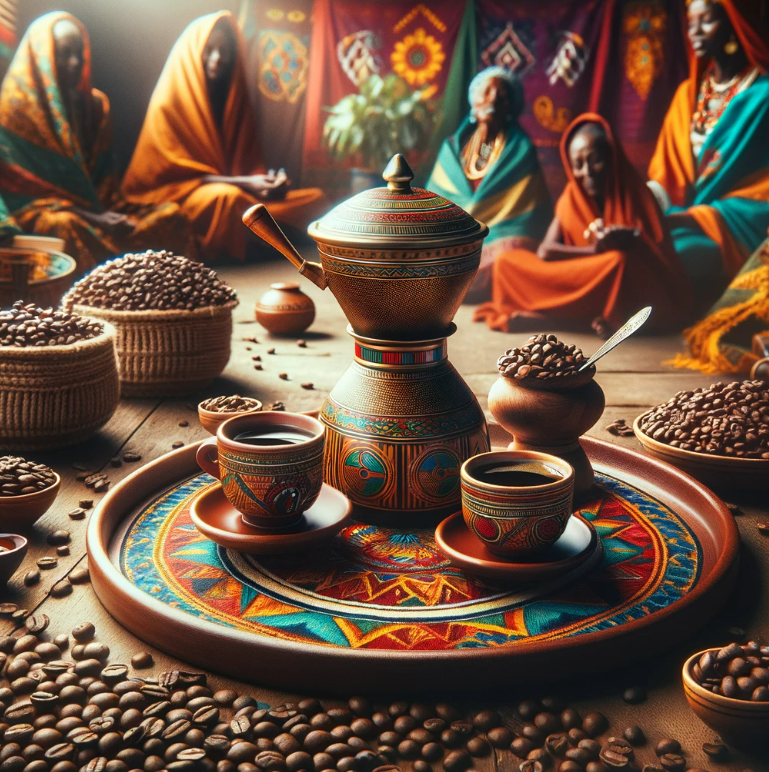Africa, the birthplace of coffee, harbors an extraordinary coffee culture deeply rooted in the continent’s rich history and diverse cultures. Here is where the journey of coffee began, and today, many African countries boast unique coffee varieties that have gained worldwide fame.
Ethiopia, often referred to as the cradle of coffee, is celebrated as the homeland of Arabica coffee. The diversity of Ethiopian coffees is astounding, ranging from fruity and floral notes to spicy and winey aromas. Among the Ethiopian coffee specialties are Harrar, Sidamo, and Yirgacheffe, each with its distinctive flavor profile. Central to Ethiopian coffee culture is the traditional coffee ceremony, a communal event where coffee is ceremonially roasted, ground, and brewed.

In East Africa, Kenya’s economy is significantly bolstered by coffee. Kenyan coffee is known for its rich, robust flavor and high acidity, making it unique and sought after on the global market. The Kenya AA coffee, a premium choice, stands out for its deep, fruity flavor profile.
In other parts of Africa, like Uganda and Tanzania, both Robusta and Arabica varieties are cultivated, offering coffee lovers a wide palette of tastes from intensely bold and strong flavors to subtler, fruity notes.
Roasting techniques in Africa traditionally emphasize the coffee’s natural flavors. Artisan roasting is becoming increasingly popular, allowing producers to highlight their coffee’s unique characteristics and flavor profile.
The variety of brewing methods in Africa reflects the social aspect of coffee drinking. From direct brewing methods, like the Ethiopian coffee ceremony, to modern expressive techniques like cappuccino and espresso, Africa’s coffee culture blends tradition and innovation.
African coffee not only delights the taste buds but also offers insight into the continent’s rich cultural heritage and the deeply rooted traditions of coffee cultivation, processing, and enjoyment.
10 Tradicional African Coffee Specialties
Africa, with its diverse climates and rich soil, is home to some of the world’s most beloved coffee varieties. Here are ten traditional African coffee specialties that highlight the continent’s rich coffee culture:
- Ethiopian Yirgacheffe – Known for its bright acidity and complex flavor profiles, featuring floral notes, citrus, and a silky smooth body. It’s often prepared using the traditional Ethiopian coffee ceremony.
- Kenyan AA – One of the most popular African coffees, celebrated for its clarity, bright acidity, and flavors of berry and citrus. Kenyan AA refers to the bean size and quality, with AA being the top grade.
- Ugandan Robusta – Uganda is one of the largest producers of Robusta coffee, which is known for its strong flavor, full body, and higher caffeine content compared to Arabica beans.
- Tanzanian Peaberry – A unique coffee where the fruit develops a single, rounded bean rather than the usual pair of flat-sided beans. It’s known for its rich aroma, medium body, and bright acidity.
- Rwandan Bourbon – Rwanda’s coffee is often of the Bourbon variety, which is known for its deep, sweet flavor with hints of chocolate and fruit. Rwandan coffee is gaining international acclaim for its high quality and distinctive taste.
- Ivory Coast Café Touba – A spicy coffee drink flavored with Guinea pepper and sometimes cloves. It’s named after the city of Touba in Senegal but is popular in Ivory Coast and other West African countries.
- Ethiopian Harrar – Harrar coffee is grown in the Eastern highlands of Ethiopia. It’s known for its winey and fruity flavors, strong body, and distinctly pungent aroma with spicy notes.
- Moroccan Spiced Coffee – Not a single variety but a way of preparing coffee with a blend of spices like cardamom, cinnamon, black pepper, and nutmeg, reflecting the rich culinary traditions of Morocco.
- South African Red Espresso – A caffeine-free alternative to traditional espresso made from rooibos tea. It’s rich in antioxidants and can be prepared just like espresso to make lattes, cappuccinos, and more.
- Malawian Geisha – Although the Geisha variety is more commonly associated with Central America, it’s also grown in Malawi, where it produces coffee with a delicate profile, floral notes, and a tea-like body.
These specialties offer a glimpse into the wide array of flavors and traditions that African coffee culture has to offer, from the well-known Ethiopian and Kenyan coffees to less common varieties like Malawian Geisha and South African Red Espresso.